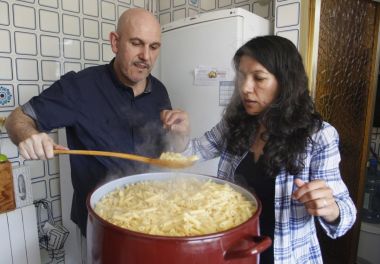Stop judging and start loving. Why we need to drop the 'holier than thou' act

Former Conservative MP Edwina Currie is well known for her outspoken views. But I could barely believe my ears when she began a series of criticisms of food banks a couple of years ago. She claimed that people using food banks were just spending their money on "tattoos and dogfood." Entirely missing from her critique was any sense that there may be structural problems which might force people to use a food bank. Trussell Trust, the Church-based network which runs many of the UK's food banks, shot back and took her to task over her remarks. But she wouldn't budge.
When I argued with her on a radio programme a couple of months later she said she'd sat in the car park at a food bank and watched the sort of people going in, as if that gave her an insight into the complex problem many food bank users are facing.
This week, Trussell Trust, along with a number of MPs and the Archbishop of Canterbury, launched a report into hunger in the UK which again prompted the question of just who is to blame for the hundreds of thousands of people reliant on food handouts.
Certainly, there are scores of commentators ready to address the structural causes such as poverty wages and benefit sanctions. But actually, in many a conversation, I've heard support for the kind of position espoused by Currie – that the people using food banks are there through their own fault and food banks aren't the answer to any of their problems.
This isn't an isolated opinion. Britain's biggest-selling newspaper has railed against food banks and the people who use them.
This attitude isn't limited to those outside the Church – there are many Christians who continue to perpetuate the myth of the undeserving poor.
This underlines a fundamental problem with our society - a lack of compassion. We often automatically presume the worst about people. Using a food bank? Well, you must have been an irresponsible, selfish, so and so. It is a lot easier to judge people from a distance than to get involved and help.
But the Gospel shows us another way. Compassion is at the heart of the Christian faith. It helps us to throw light rather than more heat on a situation where people are suffering. Here are four tips on how to respond compassionately without being naive.
1. Don't let a biased media, the narrative of judgement or the need for self preservation colour your view
First we have to acknowledge that where a free service is offered, there will always be those who take advantage of it. People who volunteer for food banks will be quick to admit that not everyone who comes through the door is an angel – and that some have spent money on goods they couldn't afford. But this small minority isn't representative of the vast majority who rely on food banks through no fault of their own – and who have been let down by both the state and the market and become reliant on the good grace of civil society – especially the Church.
2. Question your own knowledge
We need to ask how well we know those who are actually using food banks (or indeed anyone who is in a different walk of life to us). Those who volunteer their time at these vital services hear countless stories of the challenges faced by clients just to put food on the table. In this way, church food banks offer a vision of what the wider Church should look like – rather than judging people from afar – we're there alongside them in their hour of need.
3. Be honest about your own failures
This is the best way to overcome the 'us and them' mentality and to follow the model of Jesus. As a Church, we need to emulate Him and become more of a place where everyone is welcomed. We need to start this by being honest.
It would be easy for someone to come into the average church service and think, "Well, most of those people up at the front have a good education and they can speak well and they sound like they know what they're talking about. So that's what it must mean to be a real Christian. You have to have it all together, be clever and successful and well dressed and have always been like that..."
But everyone in a church is a sinner and we need to proclaim that loudly. We may not all have money troubles but we all fall short on a regular basis. In the view of Christianity that says it's all about being good and all about keeping the rules, I'd be failing miserably. So would you. So would everyone.
But in the kind of Christianity that we believe in, the kind of Christianity that welcomes anyone, especially if they've messed up, then I'm welcome. So are you. So is everyone.
This is the kind of church that won't fall for lazy stereotypes about the kind of people who are reliant on food banks. It's a church which knows food bank users not as devious ne'er-do-wells, but as sisters and brothers.
4. Practise radical welcome
But, don't we want people to move on from their difficulties and become 'good people?' I'm afraid not. Jesus isn't especially interested in making bad people just follow the rules. In fact in Luke 7 he says, "The Son of Man came eating and drinking, and you say, "Here is a glutton and a drunkard, a friend of tax collectors and sinners."
Jesus was interested in spending time with people who didn't fit in with the image of what a good, religious person looked like. He laid into the good, religious people of his day – the Pharisees. In Matthew 23 he says, "Woe to you, teachers of the law and Pharisees, you hypocrites! You are like whitewashed tombs, which look beautiful on the outside but on the inside are full of the bones of the dead and everything unclean. In the same way, on the outside you appear to people as righteous but on the inside you are full of hypocrisy and wickedness... You snakes! You brood of vipers! How will you escape being condemned to hell?"

Jesus doesn't say we have to live up to a certain standard, to live by certain rules, and then we'll be OK. Jesus says the opposite. He says stop striving to be a good person and get to know me, Jesus.
In 1 Corinthians 1 Paul says, "Not many of you were wise by human standards; not many were influential; not many were of noble birth. But God chose the foolish things of the world to shame the wise; God chose the weak things of the world to shame the strong. God chose the lowly things of this world and the despised things – and the things that are not – to nullify the things that are, so that no one may boast before him. It is because of him that you are in Christ Jesus."
It's worth remembering these four tips before we judge those who have fallen on hard times and need to use a food bank (or any other service, for that matter!) The food bank model shows that the Church cares deeply about those in need. We need to get to know people in need, live our lives alongside and then we'll be a lot slower to reach for easy stereotypes about tattoos and dog food.











